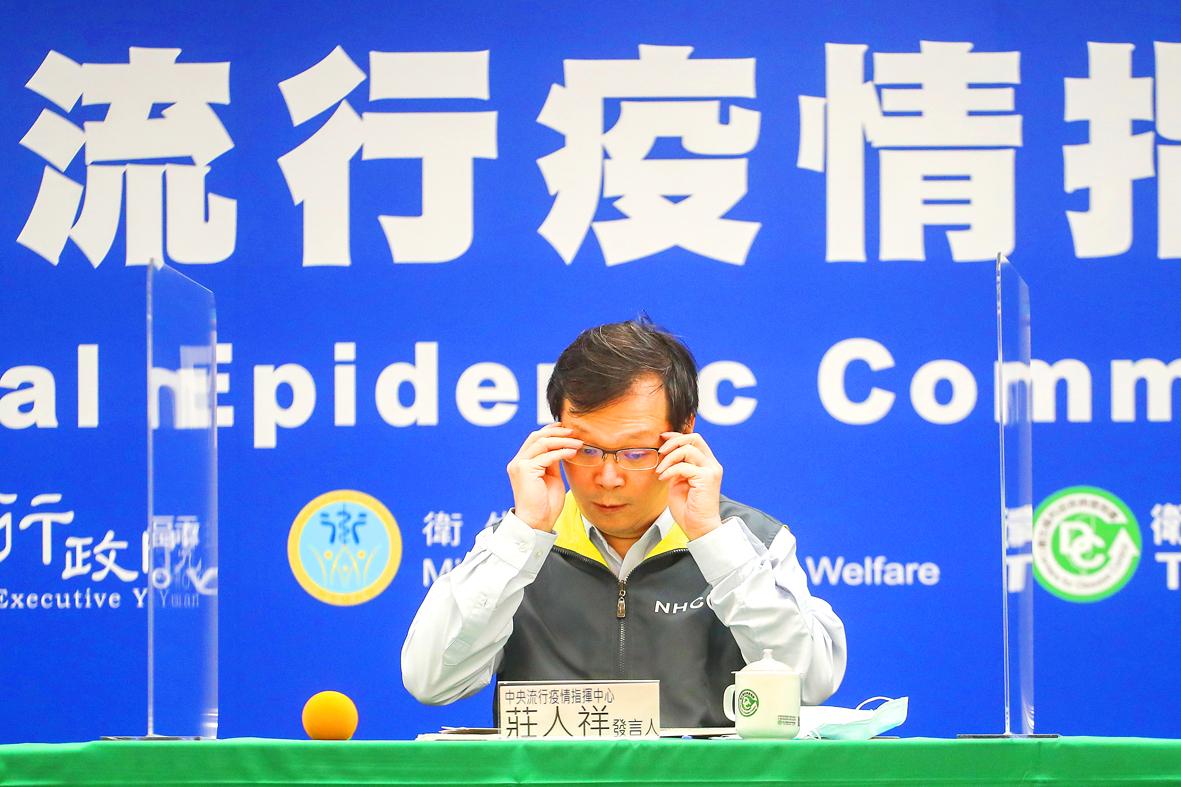As of Monday next week, international travelers who arrive in Taiwan having experienced COVID-19 symptoms within the previous 14 days would need to provide two consecutive negative test results before being allowed to return home or to a quarantine hotel, while travelers from the Philippines without symptoms would be required to stay at centralized quarantine facilities, the Central Epidemic Command Center (CECC) said yesterday.
The center also reported a new imported case of COVID-19, a Taiwanese who had returned from Poland.
Minister of Health and Welfare Chen Shih-chung (陳時中), who heads the center, said with the pandemic worsening globally, the center is expecting more people to return home to Taiwan.

Photo: CNA
“As the risk of imported cases may increase, we must remain vigilant ... to prevent the virus spreading into local communities,” Chen said.
Starting from Monday, all arrivals who are experiencing COVID-19 symptoms or had experienced symptoms in the previous 14 days would be required to take a polymerase chain reaction (PCR) test at the airport and stay at a centralized quarantine facility while awaiting the result.
“Those who test negative in the first test must then take a second PCR test at least 24 hours later,” he said.
Those who test negative in two consecutive tests and are not experiencing symptoms would be assessed by a physician before being allowed to return home or to a quarantine hotel to complete the rest of the quarantine period, he added.
With the spread of COVID-19 in the Philippines slowing, the quarantine measures for travelers arriving from the Philippines from Monday would be the same as those from other nations, Chen said.
Those arriving without symptoms would be allowed to complete the 14-day quarantine period at home or at a quarantine hotel, but also practice an additional seven days of self-health management, he said, adding that the special quarantine measures for migrant workers and international students would remain.
The latest imported case is a Taiwanese in her 20s who traveled with two colleagues to Poland for work on Sept. 16.
The three returned to Taiwan on Oct. 25 and were quarantined at home as they were not experiencing symptoms when they arrived at the airport.
The woman — case No. 569 — began experiencing fatigue, a cough, sore throat, runny nose, and loss of smell and taste between Friday last week and Sunday.
She was tested for COVID-19 at a hospital and the result came back positive yesterday, Chen said, adding that the two colleagues are not experiencing symptoms and remain in quarantine.
Meanwhile, Chen said that a fall-winter COVID-19 prevention program would be launched in the middle of this month and that the details were still being discussed.
The program would not set limits on the number of participants at events such as year-end company banquets unless locally transmitted cases with an unknown source of infection were to occur.

Right-wing political scientist Laura Fernandez on Sunday won Costa Rica’s presidential election by a landslide, after promising to crack down on rising violence linked to the cocaine trade. Fernandez’s nearest rival, economist Alvaro Ramos, conceded defeat as results showed the ruling party far exceeding the threshold of 40 percent needed to avoid a runoff. With 94 percent of polling stations counted, the political heir of outgoing Costa Rican President Rodrigo Chaves had captured 48.3 percent of the vote compared with Ramos’ 33.4 percent, the Supreme Electoral Tribunal said. As soon as the first results were announced, members of Fernandez’s Sovereign People’s Party

MORE RESPONSIBILITY: Draftees would be expected to fight alongside professional soldiers, likely requiring the transformation of some training brigades into combat units The armed forces are to start incorporating new conscripts into combined arms brigades this year to enhance combat readiness, the Executive Yuan’s latest policy report said. The new policy would affect Taiwanese men entering the military for their compulsory service, which was extended to one year under reforms by then-president Tsai Ing-wen (蔡英文) in 2022. The conscripts would be trained to operate machine guns, uncrewed aerial vehicles, anti-tank guided missile launchers and Stinger air defense systems, the report said, adding that the basic training would be lengthened to eight weeks. After basic training, conscripts would be sorted into infantry battalions that would take

EMERGING FIELDS: The Chinese president said that the two countries would explore cooperation in green technology, the digital economy and artificial intelligence Chinese President Xi Jinping (習近平) yesterday called for an “equal and orderly multipolar world” in the face of “unilateral bullying,” in an apparent jab at the US. Xi was speaking during talks in Beijing with Uruguayan President Yamandu Orsi, the first South American leader to visit China since US special forces captured then-Venezuelan president Nicolas Maduro last month — an operation that Beijing condemned as a violation of sovereignty. Orsi follows a slew of leaders to have visited China seeking to boost ties with the world’s second-largest economy to hedge against US President Donald Trump’s increasingly unpredictable administration. “The international situation is fraught

GROWING AMBITIONS: The scale and tempo of the operations show that the Strait has become the core theater for China to expand its security interests, the report said Chinese military aircraft incursions around Taiwan have surged nearly 15-fold over the past five years, according to a report released yesterday by the Democratic Progressive Party’s (DPP) Department of China Affairs. Sorties in the Taiwan Strait were previously irregular, totaling 380 in 2020, but have since evolved into routine operations, the report showed. “This demonstrates that the Taiwan Strait has become both the starting point and testing ground for Beijing’s expansionist ambitions,” it said. Driven by military expansionism, China is systematically pursuing actions aimed at altering the regional “status quo,” the department said, adding that Taiwan represents the most critical link in China’s